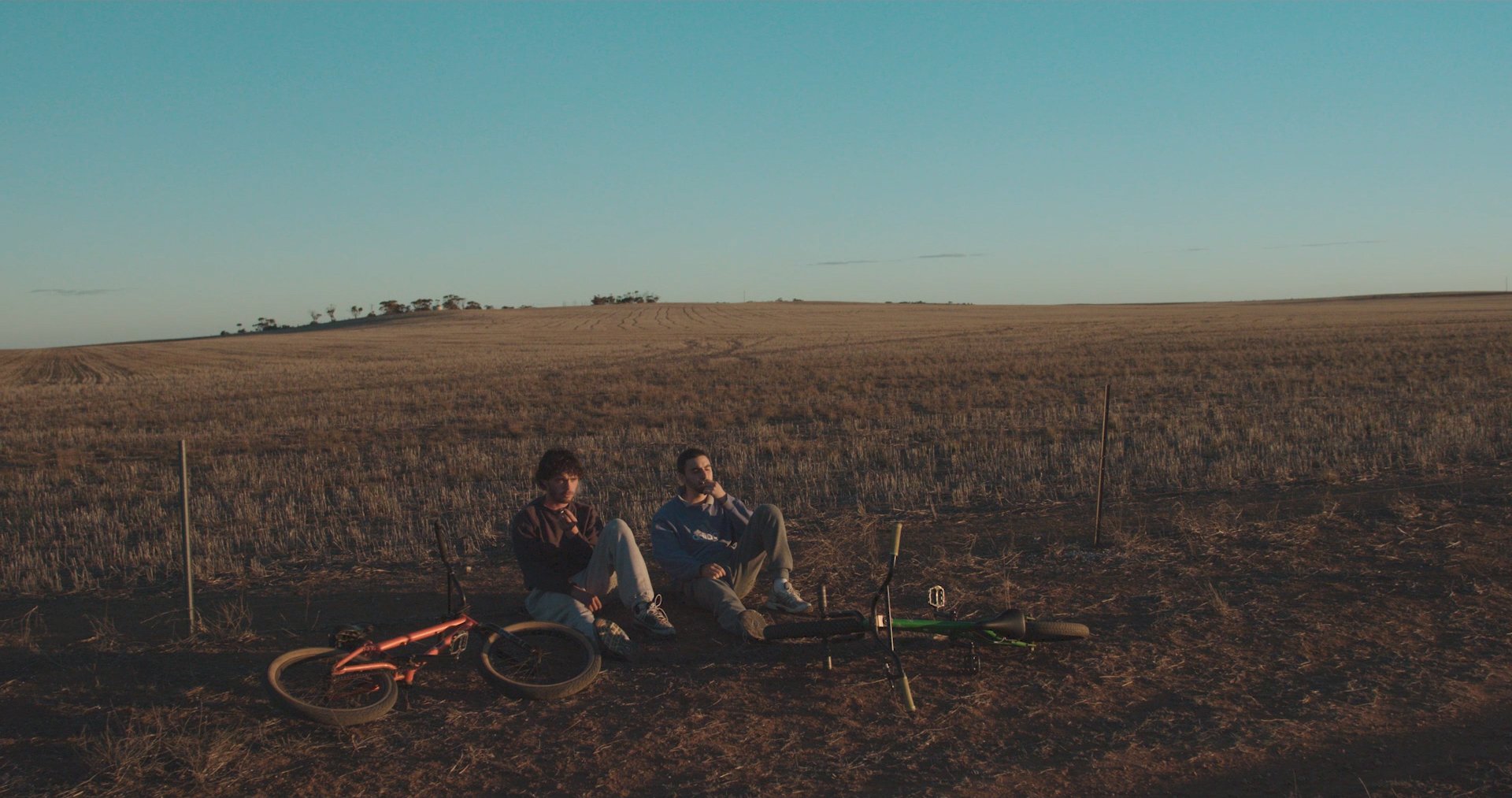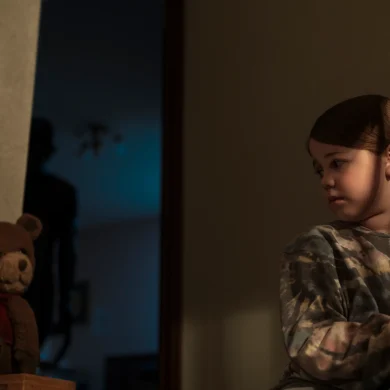Help keep The Curb independent by joining our Patreon.
The air of familiarity – quite literally – bursts in the air in the opening of the low-fi, low-budget Dry Winter, as a night in a remote, unnamed dust bowl in South Australia, is brought to life with illegal fireworks. Cheap thrills flow into ultra-low socio-economic living, with a dirt patch for a garden, backyard breeding to pay the bills, and home haircuts to save bucks where possible. Director Kyle Davis finds life in the lifeless town, breathing energy to Bridge McDonald’s keenly informed script.
The narrative, for what it is, follows a couple living together as a pair of not-quite-teens, not-quite-adults. They’re on the cusp of desolation, waiting for their inevitable collapse into the physical labour of rural life. Jake (Andrew Phillips) works odd jobs here and there, with recreational drug use and cheap beer filling in the gaps in the days. Kelly (Courtney Kelly) works at the local servo, tending to the same regular customers who keep it alive. A night out consists of Kelly watching Jake play the pokies at the pub to earn a few extra bob to pay for drinks and dinner, not exactly riveting or romantic for a young couple.
Money and luxuries are in short supply, with finances being scrawled on bedroom cupboard walls in texta, wringing each last cent out of the rent, puppies, car costs, and utilities. An opportune find of an ok nick couch helps add some casual comfort to an abode lacking the accoutrements of comfortable living. Later, that same couch becomes a makeshift tattoo parlour with a backyard tattoo further proving that these are the lives of the casual DIY’ers. Big ticket items are perpetually out of reach, but that doesn’t stop the lifestyle being sought out.
For the most part, Dry Winter never condemns or mourns the life these characters live. Instead, it lets us become comfortable with these lives, with Jake feeling as if this is the height of lifestyle that he is perfectly comfortable with attaining. It’s not until late in the film that we realise that this desolation is having a major impact on Kelly’s life, with a mundane routine of wake, work, sleep, wake, pushing her forward in life, even if it’s just in a well-trod circle. Eventually, the familiar narrative of needing to break away from the rural small-town life creeps in, as Kelly seeks a life away from this world.
Like many of these experiential films, the atmosphere of Dry Winter drives the plot, with the mood permeating through each frame, building upon itself, layer by layer, hoping to reach some kind of resonance with the viewer. Instead, the vibe that Kyle Davis’ direction conjures feels less like a guiding force, and more like the result of a ‘shoot and sort it out in the edit’.
Depending on your tolerance or appreciation of these kinds of films, that’s either a compliment or a complaint. Personally, these kinds of quiet, meditative affairs, the sort that request the audience glean the narrative and character motivations from continued lingering shots, are exactly in my wheelhouse. With that said, even I found my patience wearing thin as shots lingered on objects without any real purpose, like a static shot of a service station squeegee bucket and water can for twenty seconds. The cinematography from Gere Fuss is frank and impressive, capturing the bleakness of the dust bowl town masterfully, but the lack of context for some shots became a little frustrating.
In those moments, I wondered what kind of empathy was trying to be evoked for this small town rural experience. Davis’ lack of objectivity makes this feel like more of a documentary than a work of fiction, as if the crew just walked into a drought-stricken town and filmed for a couple of weeks. By the nature of their circumstances, Kelly and Jake are naturally reserved, holding back their internal minds and merely just sitting with the boredom they have to live with. This doesn’t make them the most engaging characters, but thanks to the solid, lived-in performances from Courtney Kelly and Andrew Phillips they do become easy to spend time with.
While Dry Winter may not challenge the notion of small town living in a substantial way, it does at least set itself apart from its thematic brethren by being absent of any pronounced drama or threat. There is precious little focus on destruction of any kind that these kinds of stories about small towns have so often become typified by. Gone is the distinct crime narrative, missing are the murders. Sure, there’s the occasional petty crime, with the Friday night wind down recreational drug use, but for many living this kind of life, it is reality. These aren’t characters looking to destroy society or tear down the world they live in, screaming to break out, they just exist. This isn’t easy living, but it certainly has become a comfortable kind of normal, at least for Jake and his friend Liam (Michael Harpas).
Drought has stunned the town into an existence that feels like it’s one dust storm away from blowing away. A highway lingers nearby, skirting the town and disrupting the remaining natural beauty of the land with its cement pylons erupting out of the otherwise serene river; a likely governmental decision from above to ‘cut out the chaff’ and help tourists get to their desired destinations quicker. Like so many small Australian towns, their lifeblood of a natural flow of people driving through is cut off, effectively nullifying the connection to reality that the town may have.
For the men of Dry Winter, dodgy drinking games and fishing by the roadside are enough for them, but for the women, it’s clear their existence in this world is a fractured one. The work, what exists of it, is mostly skewed towards the men, with physical hard labour coming in the form of shearing and building fences. For the women, it’s bar work and servo work, and that’s it. It doesn’t take much to realise why young women are leaving rural towns at a higher rate than young men, there’s simply no future life for them here. Here, the town offers no sign of encouraging any kind of rejuvenation, let alone catering for a diverse range of romance options.
As Dry Winter closes, we see how the great expanse of nothing offers little for the plenty. Prior to the agricultural industries transformation of the land, it would have been a magnificent, vibrant landscape, but now it’s devoid of its soul, and the shadow of that soul has long faded out. A post credits scene shows the future of the town, a group of kids, building a bonfire, with the barely audible dialogue of one kid saying ‘I get it now’, hinting at the notion that they should just burn it all down and start again. But with what? And if they did, what would it turn into?
Kyle Davis and Bridget McDonald have crafted a curious film here, one that has me keen to see their future efforts. It feels like it should be a depressing affair, but instead it plays in a respectful and tender tone that supports this existence, never condemning or fetishising the life folks in small towns just like this are almost forced into living. Dry Winter will suit fans of quiet, contemplative fare, even if it is similar to other films of its ilk, like Strange Colours and Watch the Sunset.
Director: Kyle Davis
Cast: Andrew Phillips, Courtney Kelly, Michael Harpas
Writer: Bridget McDonald




